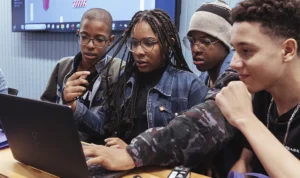It was only at the age of 18 that Eliane Souza discovered she had a disability: low vision in both eyes. “I spent my entire school years without any type of accessibility because I only discovered this when I went to take the medical exam to get my license. I adapted to the equipment that everyone uses”, he says.
Today, at 28, Eliane works in the registration area at iFood Shop and speaks openly about the subject within the company. She voluntarily coordinates Sem Barreiras, a discussion group for people with disabilities on iFood and one of the five Pólen committees — which also deals with topics related to women, black people and LGBTQIAP+ and free body movement.
But not everyone has the same ease in opening up about being a person with a disability. This is one of the challenges that Sem Barreiras works to overcome. Another is how to dialogue with those who do not live this reality and expand awareness and diversity actions to go beyond the quotas defined by law. In an interview with iFood News, Eliane tells more about the committee and how education is essential to achieving these goals.
iFN – How was the Sem Barreiras committee formed?
Eliane – Sem Barreiras is one of the aspects of Pólen, created in 2018. It is made up of 98 FoodLovers [iFood collaborators], people with and without disabilities who are interested in the subject. We have a channel on Slack [messaging application] for sharing information, experiences and day-to-day difficulties.
We see some resistance from people interacting on the channels because not everyone accepts their disability or wants to talk about it. So much so that we don't know exactly how many PWDs [people with disabilities] are on iFood or what their disabilities are. We know about cases of low vision, like mine, and people with visual, hearing and physical disabilities and autism.
In April, we created another Slack channel to talk about atypical parenting, aimed at parents of children with disabilities or parents who have a disability. In August, we intend to hold a face-to-face meeting to discuss Father's Day and promote a chat and exchange of experiences between iFood employees.
iFN – Is “not talking about your disability” one of the barriers to be overcome?
Eliane – Exactly. There is a stigma that people with disabilities cannot do things. And either she is always treated in a diminutive way, as a poor thing, or as heroic for being able to do a certain task.
We try to bring these people with disabilities as close as possible to show that there is nothing heroic or childish about them, that we are capable of doing anything.
iFN – It seems to be a support group. Or is it more than that?
Eliane – I think it’s more than that. Yes, there is support and exchange of experiences. We bring people who talk openly about their disabilities, impacts and learning.
We try, in some way, to take advantage of the experience of those who show ease in talking about their disabilities, to engage. But we also act as a type of consultancy when a person with a disability comes to iFood, in the education and awareness of people without disabilities.
iFN – What do you debate on these channels? Has anything already been put into practice?
Eliane – iFood already looks a lot at accessibility issues. Whenever a person with a disability is hired, the company is committed to adapting to their needs, providing and adapting the programs and equipment they need to use. The technology team also offers all the necessary support.
That's what recently happened to a visually impaired person who started using iFood. The applications have already been adapted for him to work from home and now we are preparing the office to be more accessible, with a tactile floor. The team that will receive it was also prepared, with the provision of a booklet. O onboarding [integration] was a little different.
In our channels, meetings and communication content, we don’t talk so much about accessibility. We address disabilities more, we put together booklets and carry out informative activities for people who are not disabled. Because anyone with a disability already has knowledge on the subject. Additionally, the company provides accessibility support.
iFN – How do you bring people without disabilities into this reality?
Eliane – In terms of literacy, we have courses on the iLearning platform [online education for iFood employees] and we rely on the communications team to share our information with all employees.
We have carried out lives, which receive good feedback from the public with comments such as: “I didn’t know this information, I’ll join”. Or even: “I didn’t know that term was ableism [prejudice against people with disabilities], I’m going to change my behavior.”
Unfortunately, a lot of literacy is still needed, especially from senior management, who, in general, do not have direct contact with people with disabilities at their hierarchical level. The majority of people with disabilities are in operations and do not have as much contact with those in management.
Many companies end up hiring people with disabilities simply to receive a government benefit or out of obligation. It is very difficult for managers to say “I want to hire a person with a disability because of diversity”.
iFN – What is the group’s big dream?
Eliane – A more diverse and inclusive company, with employees with the most different disabilities, so that these people can grow here and reach management positions. We want to see people with disabilities beyond the quota. We want managers to have the initiative to hire us for pleasure, because they know that that person will be able to perform their duties well.


